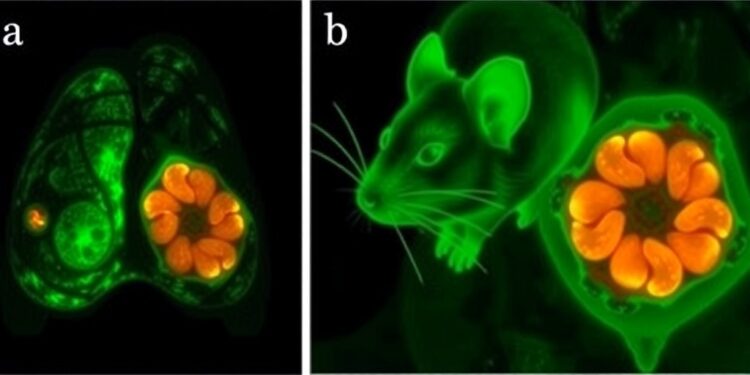Breast cancer continues to be one of the most formidable challenges in oncology, claiming the lives of countless women and underscoring the critical need for innovative treatment strategies. While advancements in therapeutic modalities have improved survival rates, the toxicities associated with conventional treatments—such as surgery and prolonged hormone therapy—present substantial hurdles to patient quality of life. These long-term repercussions often include conditions like osteoporosis, blood clots, and sexual dysfunction, leading researchers to seek alternatives that maximize efficacy while minimizing adverse effects.
Recently, a team led by Paul Hergenrother has made a groundbreaking advancement in breast cancer treatment. Published in the prestigious ACS Central Science, their study presents a novel small molecule, ErSO-TFPy, which has shown remarkable efficacy in eliminating small tumors in mouse models while significantly reducing the size of larger ones with just a single dose. This approach has the potential to shift the paradigm away from traditional long-term hormone therapies, offering new hope for those affected by estrogen receptor-positive (ER+) breast cancer.
ER+ breast cancer is particularly notorious due to its reliance on estrogen to promote tumor growth, making conventional hormonal treatments essential in combating this disease. However, these therapies are not without their complications, as patients face a myriad of side effects that can detract from their overall well-being. Hergenrother and his colleagues had previously developed an initial compound known as ErSO that targeted these ER+ cancer cells effectively but was still associated with unwelcome side effects.
In their latest endeavors, the researchers synthesized various ErSO derivatives and focused on one specific compound, ErSO-TFPy. Preliminary findings indicated that this new molecule boasts enhanced selectivity and potency against ER+ cancer cells, paving the way for a more tailored therapeutic regimen. The critical breakthrough was demonstrated when ErSO-TFPy was tested in mouse models; the results showed that it could induce either complete or nearly complete tumor regression across a spectrum of different genetic backgrounds.
The implications of this discovery are profound. As many cancer treatments require continuous dosing, the capacity of a single-dose administration of ErSO-TFPy presents several advantages. It reduces the potential for cumulative toxicity while also lessening the treatment burden on patients, who often find themselves navigating complex regimens. The idea that a single administration of a well-tolerated compound could bring about such substantial tumor reduction is an inspiring testament to the advancing field of targeted therapeutics.
Furthermore, the effectiveness of ErSO-TFPy in shrinking tumors presents an exciting avenue for research into the mechanisms behind its action. The researchers speculate that its novel structure may allow for a more selective binding to cancer cell receptors, elucidating a pathway for cancer cells to be targeted while sparing healthy tissues. This not only accelerates the need for further pharmacological investigations but could also inspire the design of new derivatives that might enhance efficacy.
Although these early findings are encouraging, the authors are quick to temper expectation with calls for additional testing to firmly establish the drug’s safety and efficacy before it can be transitioned into clinical use. They acknowledge that translating these results from mouse models to human patients involves a significant leap, one that demands rigorous clinical evaluation.
Moreover, the study reflects a broader ethos in cancer research: the urgent need to tailor therapies to individual patient profiles. The high degree of heterogeneity found in breast cancer necessitates targeted treatments that account for genetic and molecular variability among patients. As research progresses with ErSO-TFPy, it could be emblematic of a larger shift towards personalized medicine in oncology.
As we look to the future of breast cancer treatment, the potential of ErSO-TFPy to fundamentally alter the landscape of how ER+ tumors are addressed is genuinely exciting. Should subsequent studies validate these initial results, this compound could indeed mark a turning point in the battle against breast cancer, offering new hope to patients and healthcare professionals alike.
In closing, Hergenrother’s enthusiasm for the next phases of research underscores the impactful nature that innovative treatments can have on a much-embattled patient population. “It is rare for a compound to shrink tumors in mouse models of breast cancer, let alone completely eradicate those tumors with a single dose,” he states, emphasizing the significance of these findings. As onlookers await further developments, the scientific community remains hopeful for what lies ahead in the pursuit of more efficacious and humane breast cancer therapies.
Subject of Research: Development of a novel small molecule for the treatment of ER+ breast cancer
Article Title: Single Dose of a Small Molecule Leads to Complete Regressions of Large Breast Tumors in Mice
News Publication Date: 22-Jan-2025
Web References: http://pubs.acs.org/doi/abs/10.1021/acscentsci.4c01628
References: DOI 10.1021/acscentsci.4c01628
Image Credits: N/A
Keywords: Breast cancer, ER+ cancer treatments, cancer research, drug discovery, personalized medicine.





